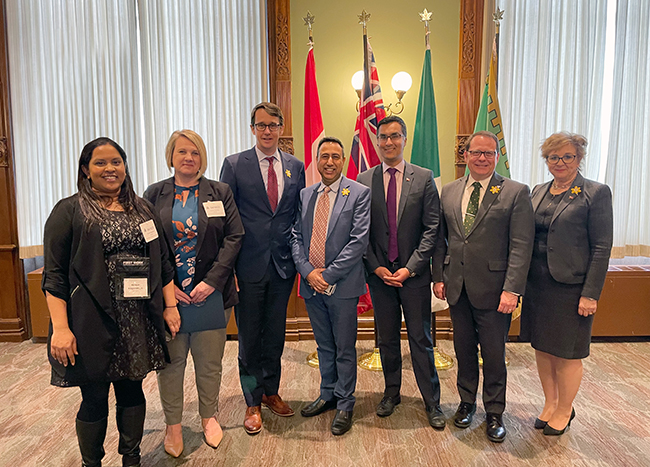First Work’s primary focus is to cultivate a healthy workforce development ecosystem.
We aim to foster a strong and resilient Employment Services Sector – one that champions inclusive Equity, Diversity and Justice initiatives – so that evidence- and community-led insights can advance transformational policy at all levels of government.
The expertise offered by our network of employment service providers influence all First Work’s advocacy efforts, keeping Ontario’s most vulnerable at the heart.
By meeting the needs of those most vulnerable, we uplift all communities, economies and individuals in Canada.
First Work’s
Advocacy Pillars:
- Youth, particularly newcomers and those from equity-seeking groups
- Employment & Social Services Sector
- Employers & Labour Market
These pillars are intended to support audience-specific policy initiatives, though aspects of policy may overlap between pillars.
Pillar #1 – Youth/Jobseekers facing barriers to Employment
A sustainable, future of work for Canada is one that meets the needs of all youth – particularly those from equity-seeking groups – providing access to job exploration and wraparound supports required for career success.
It is the responsibility of the Federal and Provincial governments to ensure all youth – irrespective of status – can access the transformative ESP supports which benefit the jobseeker, their community, and Canada’s economic growth.
This pillar is dedicated to ensuring equal access to opportunities and resources to all youth for employment, and tailored support to priority youth who encounter barriers to employment. This pillar aims to, first and foremost, ensure jurisdictional funding agreements initiated by the Federal government understand and support youth-specific funding for employment services. The critical concern of this pillar is addressing the challenges faced by priority youth groups so that they can fully engage with the Canadian job market and grasp the potential Canada offers.
These priority youth groups are:
- Indigenous, racialized (Black, Asian, and others), LGBTQ+ and female youth
- Youth from low-income families and/or in rural or remote areas
- Newcomer, immigrant and refugee youth
- Youth with disabilities and /or mental health challenges, pregnant or parenting youth
- Youth exiting juvenile justice system, foster care and /or experiencing homelessness
- International students
Pillar #2 – Employment & Social Services Sector
A robust social services sector, one which enables individual and community prosperity through employment supports servicing both the jobseeker and the employer, is necessary to ensure workforce development policy is nimble and attune to the needs of regional economies.
Canada must foster the creation of meaningful partnerships between employment services and educational institutions for effective career exploration and guidance.
ESPs must be engaged and consulted in the policy tables developing workforce strategies for the long-term health of both national and regional economies.
This pillar underscores the importance of enhancing the employment service sector and the crucial role of practitioners in creating a comprehensive eco-system of support services for youth workforce development. The critical concerns under this pillar include revitalizing and enhancing funding programs like Canada Summer Jobs to support youth employment and addressing the school-to-work transition challenges faced by young people. The pillar aims to foster a strong social services ecosystem create meaningful partnerships between employment services and educational institutions for effective career exploration and guidance.
- Developing a comprehensive eco-system of support services for workforce development
- Customized and targeted outreach according to unique needs and specific challenges
- Programs for skills Training, reskilling, and upskilling with hard and soft skills
- Work Experience initiatives like internships, co-op placements, apprenticeships etc.
- Mentorship and Networking connections with experienced professionals
Pillar #3 – Employers & Labour Market
Data-informed strategies and strategic partnerships with stakeholders – which ensure wraparound supports for both jobseekers and employers – will facilitate more seamless Youth workforce entry and critical long-term labour market planning.
The third pillar emphasizes employing data-informed strategies for analyzing job market trends and building strategic partnerships with stakeholders, particularly targeting small and medium-sized enterprises (SMEs). Recognizing the integral role of employers to keep local communities thriving, the labour market data is integral to the success of the strategy. The critical concern here is to ensure that necessary wraparound supports are in place to facilitate youth entry into the workforce while helping employers diversify, retain, and improve employee well-being.
- Leveraging digital innovation and accessibility resources like user-friendly AI-powered Platforms
- Employing data-informed strategies to analyze job market trends, skills gaps, and best practices
- Building partnerships with educational institutions, employers, industry associations, community organizations, and government agencies
- Ensuring community service organizations are funded to offer the required wraparound supports to both jobseekers and employers to grow local economies inclusively.
Our overarching advocacy
objectives are to:
- Increase Government insight to and communication with the youth employment sector, both provincially and federally.
- Amplify the voice and expertise of the youth workforce development sector.
- Highlight the positive impact of the youth employment service providers on local communities.
Government Submissions
Fall 2025 Federal Pre-Budget Submission
2025 Federal Pre-Budget Submission
2024 Federal Pre-Budget Submission
2024 Ontario Budget Submission
2024 Ontario Pre-Budget recommendations
2023 Ontario Pre-Budget Submission
2023 Federal Pre-Budget Submission via CCCBET
2022 Pre-Budget Submission
2022 Pre-Budget Recommendations to Ontario’s Standing Committee on Finance and Economic Affairs
2021 Recovery Recommendations to Ontario’s Standing Committee on Finance and Economic Affairs
2020 Pre-Budget Submission
Workforce Development
Challenges & Solutions
Workforce development policy in Canada must change to meet the challenge and opportunity presented by the Future of Work.
First Work’s vantage point between community service providers and employers offers an Ontario-wide, yet localized lens which can be leveraged across the country.
A sustainable, future of work for Canada is one that meets the needs of all youth – particularly those from equity-seeking groups – providing access to job exploration and wraparound supports required for career success. Offered via a robust social services sector, this necessary support enables individual and community prosperity through employment supports servicing both the jobseeker and the employer. With these supports, Canada’s local communities can thrive.

CHALLENGES
- Extended unemployment at the outset of a young person’s career can have profound, long-lasting impacts, impeding job growth and salary earnings, the impact of which is known as career scarring.
- Canada’s employers are facing a tight labour market amongst skills mismatch, impeding successful hiring and retention efforts.
- Finding ‘untapped’ talent
- Sector staffing competition falling short against Private Sector.
- Service providers are also under increasing pressure to deliver more for less, relying on other funding streams to compensate for shortfalls in program allotments.
SOLUTIONS & RECOMMENDATIONS
- Social support services should be offered via a robust social services sector, which enables individual and community prosperity through employment supports servicing both the jobseeker and the employer.
- Meet the needs of all youth – particularly those from equity-seeking groups – providing access to job exploration and wraparound supports required for career success.
- Ensure jurisdictional funding agreements initiated by the Federal government understand and support youth-specific funding for employment services.
- Employ data-informed strategies for analyzing job market trends and building strategic partnerships with stakeholders, particularly targeting small and medium-sized enterprises (SMEs).
- Ensure necessary wraparound supports are in place to facilitate youth entry into the workforce while helping employers diversify, retain, and improve employee well-being.
- ESPs must be engaged and consulted in the policy tables developing workforce strategies for the long-term health of both national and regional economies.

Advocacy Days
First Work hosts Advocacy Days for strategic Network Members to directly engage with elected representatives and bureaucrats, and watch the political process at work. First Work then hosts a reception for elected representatives in the Legislative Committee Room. We provide information about our collective vision for workforce development and invite them to their community employment centers.
The Queen’s Park Advocacy Day enables relationship building with provincially elected representatives.
The Hill Day Advocacy enables relationship building with federally elected representatives and their senate counterparts.
The Government Leaders, Ministers, and Opposition Leaders will be invited to address our delegation and outline their priorities for workforce development.

Policy
Issues
Overarching Issues
-
Providing distinctive support for Newcomers (including refugees and international students) to help them harness Canada’s opportunities.
-
Facilitating a seamlessschool-to-work transition for young people, by offering resources while they remain connected to educational institutions to meet youth where they’re at and guide them into in-demand fields.
-
Ensure wraparound supports for both jobseekers and employersthereby bolstering the prosperity of Canada’s small and medium-sized enterprises, vital for the vibrancy of local economies.
Policy Issues
- Youth-specific employment services
-
Employment Services Transformation Policy Improvements, including:
- 20-hour rule
- Input pathway for Practitioners
- Service Delivery allotments for Service System Managers
- Operational funding freeze since ~2010
